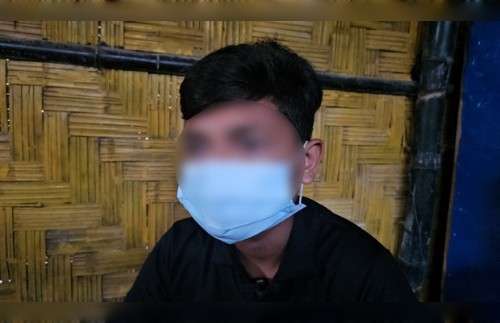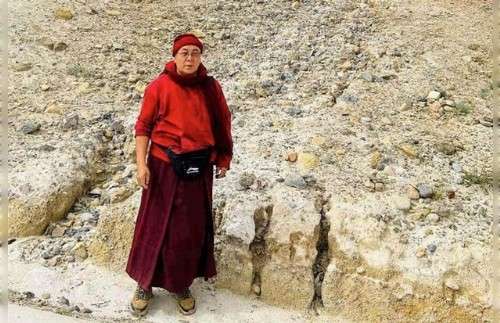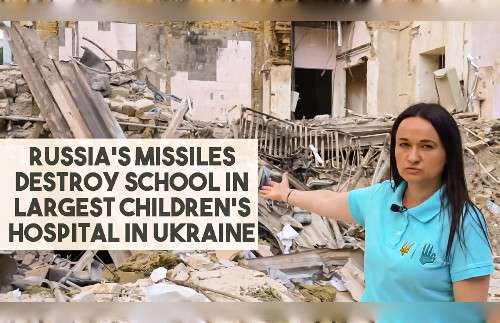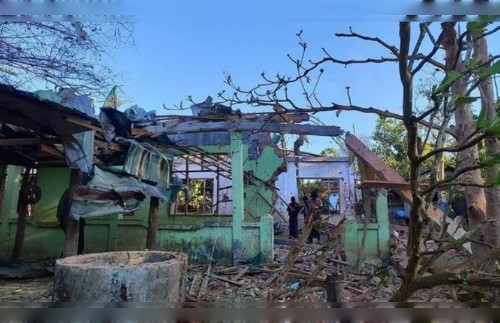A young Uyghur girl was recently found to have drowned in an area of northwest China’s Xinjiang Uyghur Autonomous Region (XUAR), where many adults are being held in political “re-education camps” and cannot provide care for their children, according to sources.
A recent post on social media said that a “child’s body was recovered from a river” near a graveyard in the seat of Hotan (in Chinese, Hetian) prefecture’s Ilchi district in May and brought to the Hotan People’s Hospital, without providing information about the victim.
While investigating the report, RFA’s Uyghur Service spoke with a staff member at the hospital’s Epidemiology department who said he had no knowledge of the incident, while other sources at the Hotan City Women’s Union also were unable to offer any details about the case.
When RFA contacted the police department in Ilchi district, an officer said he had no specific information about the child but that his colleague, Ibrahim, had “dealt with the incident.”
Officer Ibrahim refused to take RFA’s calls, however.
Two Hotan-based sources, who spoke to RFA on condition of anonymity, were able to provide a few more details about the incident.
One said the victim was “a girl … about five years old” from Ilchi district’s No. 3 Neighborhood Committee—also known as the Sultanim Neighborhood Committee—though they were unable to provide the child’s name.
“I heard that she died five or six days before her body was recovered,” the source added.
The second source told RFA that the girl had “died after falling into … a branch” of a river in Hotan.
The source was unsure of the girl’s name or when she had died.
When asked whether the young girl’s parents had been interned in China’s vast network of political re-education camps, where up to 1.5 million Uyghurs and other Muslim ethnic minorities accused of harboring “strong religious views” and “politically incorrect” ideas have been held since April 2017, the source said they were unsure.
Editor’s Note: Here we add a video by Human Rights Watch, a U.S based human rights organizations which highlights the fact that Chinese authorities are using a mobile app to carry out illegal mass surveillance and arbitrary detention of Muslims in China’s western Xinjiang region, Human Rights Watch said in a report released recently. The report, “‘China’s Algorithms of Repression’: Reverse Engineering a Xinjiang Police Mass Surveillance App,” presents new evidence about the surveillance state in Xinjiang, where the government has subjected 13 million Turkic Muslims to heightened repression as part of its “Strike Hard Campaign against Violent Terrorism.”
“We only heard that the missing child was recovered from a river,” the source said, adding, “We don’t know anything about the parents.”
Children at risk
RFA has previously reported about how Uyghur children whose parents are held in camps are regularly sent to orphanages that are seriously overcrowded, with sources calling the conditions “terrible” and describing children “locked up like farm animals in a shed.”
RFA has also received several reports of Uyghur children in the XUAR dying or suffering severe injuries while their parents are detained and they lack adequate care.
In December last year, Rahmutullah Shirbaqi, the two-year-old son of a Uyghur couple detained at a camp in Hotan’s Qaraqash (Moyu) county, drowned after falling through ice into an irrigation ditch while in the care of his elderly grandparents.
In August 2018, sources told RFA that a 10-year-old boy from Kashgar (Kashi) prefecture’s Makit (Maigaiti) county, whose parents were being held in a re-education camp, had drowned in the area’s Zerepshan River.
And in March last year, sources reported that eight-year-old Esma Ahmet, whose father was being held at a re-education camp, had suffered burns to nearly 60 percent of her body a month earlier when a stove overturned at her home in Hotan’s Guma (Pishan) county, and was in urgent need of medical treatment.
Camp network
Though Beijing initially denied the existence of re-education camps, China has tried to change the discussion, describing the facilities as “boarding schools” that provide vocational training for Uyghurs, discourage radicalization and help protect the country from terrorism.
Reporting by RFA’s Uyghur Service and other media outlets has shown that those in the camps routinely face rough treatment at the hands of their overseers, and endure poor diets and unhygienic conditions.
Adrian Zenz, a lecturer in social research methods at the Germany-based European School of Culture and Theology, has said that some 1.5 million people are or have been detained in the camps—equivalent to just under 1 in 6 members of the adult Muslim population of the XUAR—after initially putting the number at 1.1 million.
Michael Kozak, the head of the State Department’s human rights and democracy bureau, in an apparent reference to the policies of Hitler’s Germany and Stalin’s Soviet Union, said in March that people “haven’t seen things like this since the 1930s” and called the internment of more than a million Uyghurs “one of the most serious human rights violations in the world today.”
In November 2018, Scott Busby, the deputy assistant secretary in the Bureau of Democracy, Human Rights and Labor at the U.S. Department of State, said there are “at least 800,000 and possibly up to a couple of million” Uyghurs and others detained at re-education camps in the XUAR without charges, citing U.S. intelligence assessments.
Reported by Shohret Hoshur for RFA’s Uyghur Service. Translated by RFA’s Uyghur Service. Written in English by Joshua Lipes
Copyright © 1998-2016, RFA. Used with the permission of Radio Free Asia, 2025 M St. NW, Suite 300, Washington DC 20036 https://www.rfa.org
















